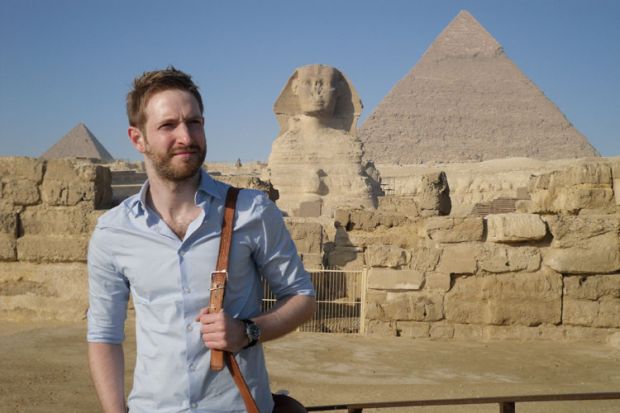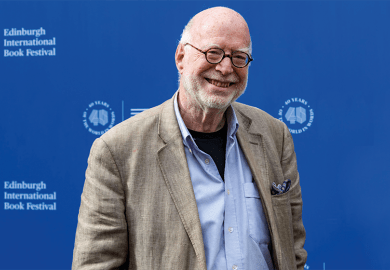Chris Naunton is an Egyptologist who studied for his PhD at Swansea University. Since 2001 he has worked for the Egypt Exploration Society, a charity dedicated to exploring ancient Egyptian sites and monuments and to creating a lasting record of the remains. He is currently director of the EES. In August, he was elected president of the International Association of Egyptologists, a non-profit making organisation that aims to promote the field.
Where and when were you born?
Kingston Hospital, Surrey, 23 February 1978.
What was your reaction to discovering that you were successful in your election bid for the IAE presidency?
I was surprised, elated, excited, humbled, daunted and then excited again.
What are your plans for the presidency?
I want to revive the organisation after a quiet few years, despite everything that has happened in the world and in Egypt especially. Egyptology faces numerous challenges, from the security of archaeological sites in Egypt itself to all the classic issues for a humanities subject – funding shortages, a rapidly changing publishing landscape and the need to balance scholarly rigour with the public appeal that provides much of the support that the subject needs.
Egyptology has long been associated with tomb raiding and mummies. Is this stereotype a help or a hindrance to promoting the field to a wider audience?
On the whole, it’s a help. Tombs and mummies remain a central part of many Egyptologists’ scholarly research and day-to-day business. The challenge is in showing the public that there is much more to our subject, and much more to be learned about the people who lived in Egypt and the surrounding territories in the past. But we have to embrace the fact that tombs and mummies are often what hook people in the first place, and there’s nothing wrong with that.
What significance is given to the field within the academy?
I think many of us would like to see Egyptology integrating better with related disciplines; archaeology in Egypt can sometimes seem a little adrift from the rest of archaeology, for example, and that’s something for the association to work on. But I think in general it’s quite rightly regarded as highly as any other academic discipline.
What has changed most in higher education in the past 10 years?
First, the British Academy’s decision, after 60 years, to withdraw its funding for the EES, the UK’s principal institutional representative for archaeology in Egypt. This means that most British archaeological fieldwork in Egypt is now funded by subscriptions and donations provided by members of the public. Second, there has been something of a shift away from purely academic postgraduate degrees such as Egyptology towards more vocational degrees in related fields such as heritage management and museology. It’s obviously driven by economics and students’ desire to make themselves as employable as possible, but our subject will always need those with purely academic training, and any reduction in the pool of candidates is a cause for concern.
What’s your most memorable moment at university?
Getting my degree result and the mixed emotions that followed knowing that although I got the result I wanted some of my best friends on the same course didn’t. I’m still angry that there was apparently no better way than pinning a couple of pieces of paper with everyone’s result on to the notice board for the entire university to see.
If you were a prospective university student facing £9,000 fees, would you apply or go straight into work?
I fear the 50 per cent [of young people going to university] situation has polarised young people into the “haves” and the “have-nots” and stigmatised the latter unfairly. So I would favour a situation in which universities were reserved for more purely academic subjects, and young people were offered a far greater range of options on leaving school including university but also more workplace-oriented apprenticeships. I am very grateful to have had the opportunity to earn three degrees in a subject that fascinates me, and as someone who is naturally fairly studious, a university degree even at £9,000 would probably always be right for me. But I have learned just as much “on the job” since leaving university as I did while studying.
As a child, what did you want to do when you grew up?
Play for Arsenal, be the Doctor (as in Who) and, a few years later, play guitar for Radiohead. Egyptology is probably closest to the second of those.
What do you do for fun?
I’m not sure I do anything much that anyone would regard as fun! I take a lot of photos, in Egypt especially; I try to get to as many art-house films as possible; I write a blog about gigs; I do quite a bit of cycling and running; and I like to read the newspapers at home with breakfast and nice music at the weekend. Does any of that count?
The great monarchs of Ancient Egypt were often buried with prized possessions. What would you choose to be buried with and why?
Some clothes to protect my dignity at the time of burial but nothing else – I don’t see the point. I’d prefer any material things to be passed on or recycled, reused, sold and so forth – they’d be of no use to me.
Have you, at any stage of your professional life, believed in the curse of Tutankhamun?
No!
Appointments
The University of Bristol has appointed Erik Lithander as its new pro vice-chancellor for international and student recruitment. Dr Lithander is currently pro vice-chancellor (international and outreach) at Australian National University and will swap Canberra for Bristol on 1 February 2016. He will lead on student-focused international activity for the university, particularly international recruitment, international partnerships with other universities, student mobility and international work placements. “Bristol is rightly recognised as one of the world’s leading research-intensive universities, and is well positioned to make significant further advances in the years ahead,” Dr Lithander said.
Elwen Evans QC has begun her role as head of Swansea University’s College of Law. Professor Evans, who joined the university at the beginning of August, is one of the UK’s leading barristers. “I believe there is a golden opportunity for the college to play a significant role in a national and global context and I am delighted to lead a team that will influence the next generation of law graduates and lawyers,” she said.
Paul Leinster has been appointed professor of environmental assessment at Cranfield University. Dr Leinster, who joins in October, comes to Cranfield from the Environment Agency, where he has been chief executive since 2008.
Breda Walls has joined the University of Nottingham in the newly created role of chief student management officer. Ms Walls will take responsibility for the administration of student services at Nottingham and will also sit on the executive board.
York St John University has appointed Rob Aitken as dean of the Faculty of Health and Life Sciences. Professor Aitken began his role at the start of September and joins from the University of Glasgow where he was head of the School of Life Sciences.
POSTSCRIPT:
Print headline: HE & me
Register to continue
Why register?
- Registration is free and only takes a moment
- Once registered, you can read 3 articles a month
- Sign up for our newsletter
Subscribe
Or subscribe for unlimited access to:
- Unlimited access to news, views, insights & reviews
- Digital editions
- Digital access to THE’s university and college rankings analysis
Already registered or a current subscriber? Login




